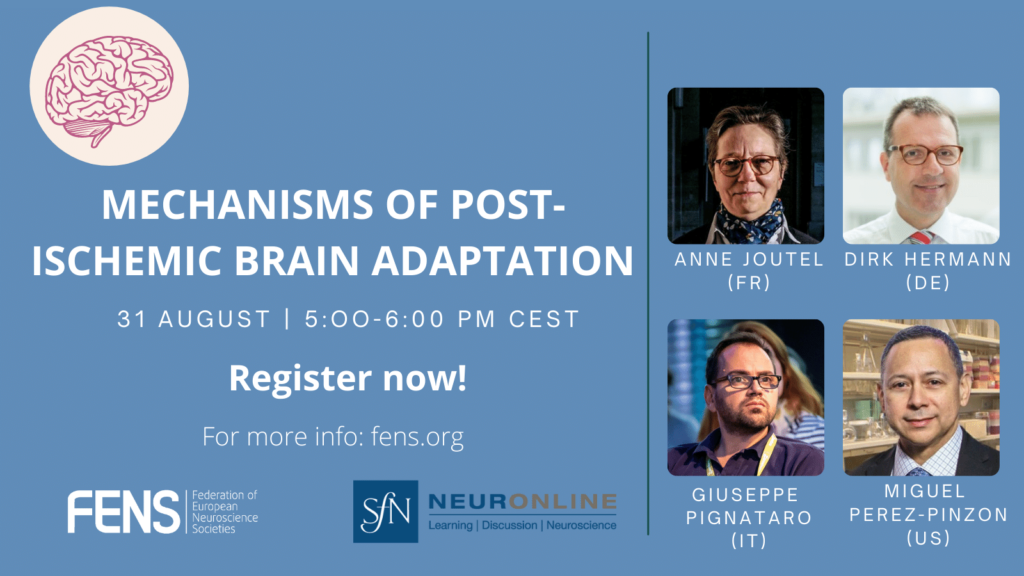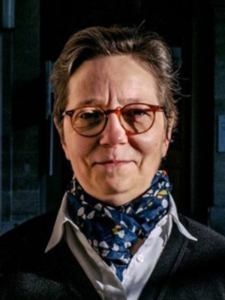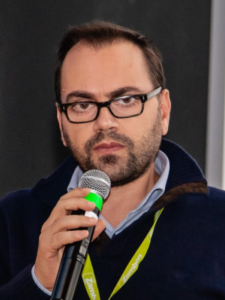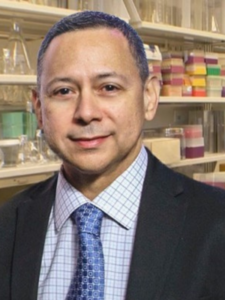
Join the live webinar on Neuronline: Mechanisms of Post-Ischemic Brain Adaptation
09 August 2021
FENS News, Society & Partner News
Registration is now open to the webinar “Mechanisms of Post-Ischemic Brain Adaptation” taking place on 31 August 2021 (5:00-6:00 pm CEST). This webinar is organised by FENS and hosted on Neuronline, the SfN virtual platform.
This webinar will discuss mechanisms involved in post-ischemic brain adaptation. The knowledge of these mechanisms may provide information to bring light to those molecular pathways involved in brain protection.
In this webinar, speakers will cover points including:
- Post-ischemic brain remodelling and plasticity, evaluating pathomechanisms contributing to secondary brain injury and searching strategies that promote neurological recovery in the post-acute stroke phase.
- What is the function of peripheral events in inducing brain tolerance to stroke?
- The plethora of factors can influence the tolerance phenomenon occurring during pre-and post-conditioning.
- Why it is important to escape a neuron-centric view and to consider the role of other cell types, including small vessels, in the mechanism of brain adaptation.
Date & time:
Tuesday, 31 August, 5-6 pm CEST
Speakers:
 |
Anne Joutel, PhD
Anne Joutel is the Inserm Research Director at the Institute of Psychiatry and Neurosciences of Paris. Joutel’s research focuses on the pathogenesis of cerebral small vessel diseases. Her lab has specific expertise in the generation/characterization of small vessel disease mouse models, in molecular and histological analyses of small brain vessels and brain parenchyma, the identification of novel molecular targets through unbiased (transcriptomics & proteomics) and hypothesis-driven (e.g., biochemical) studies on brain microvessels from mice and patients and the validation of these targets through genetic interaction studies in the mouse. She was trained in clinical neurology and neuroscience. She received her MD from Paris Denis Diderot University and is board certified in neurology. She earned her PhD in neurogenetics from the Pierre and Marie Curie University (Paris, France).
|
 |
Dirk Hermann, MD
Dirk Hermann is the chair of vascular neurology, dementia and ageing at Essen University Hospital. Hermann received his MD at Claude Bernard University (Lyon, France) and performed his clinical and scientific specialization at the Max Planck Institute of Psychiatry (Munich), the Max Planck Institute of Neurological Research (Cologne) and the Department of Neurology (Tübingen University Hospital).
|
 |
Giuseppe Pignataro, PhD
Giuseppe Pignataro is an associate professor in the department of Neuroscience at University of Napoli, Italy. Pignataro has used in vivo and in vitro approaches to study the mechanisms underlying brain damage induced by episodes of brain ischemia and other neurological disorders such as Amyotrophic Lateral Sclerosis. A considerable effort has been devoted to the study of endogenous mechanisms of neuroprotection such as ischemic tolerance. He received his MD and PhD in neuroscience from University in Napoli and performed postdoctoral training at the Legacy Research Institute, Portland.
|
 |
Miguel Perez-Pinzon, PhD
Miguel Perez-Pinzon directs the Pertiz Scheinberg’s Cerebral Vascular Disease Research Center at the University of Miami. Perez-Pinzon’s main research expertise is in the area of cerebral ischemia, which results from cardiac arrest or stroke. Perez-Pinzon’s research focuses on the areas of synaptic, cognitive, vascular and mitochondrial dysfunction that ensue following cerebral ischemia. Over the last 20 years, Perez-Pinzon’s laboratory has investigated the signaling pathways that lead to neuroprotection against ischemia following ischemic preconditioning (IPC).
|